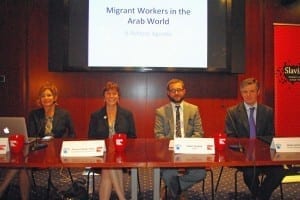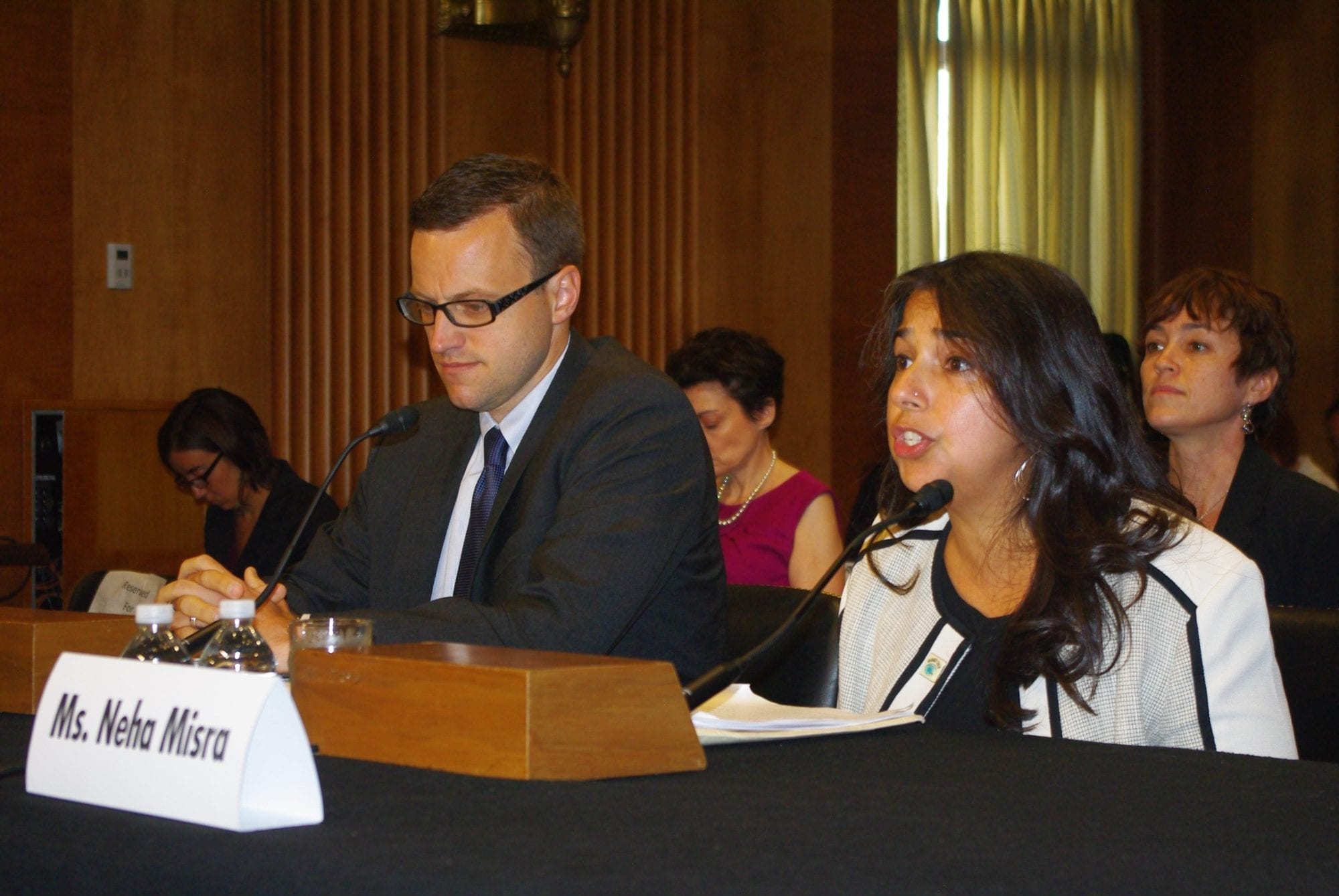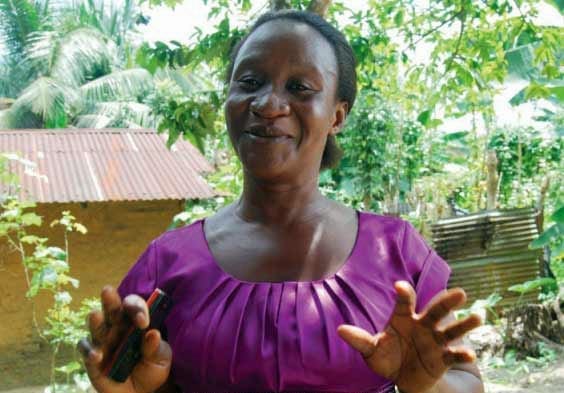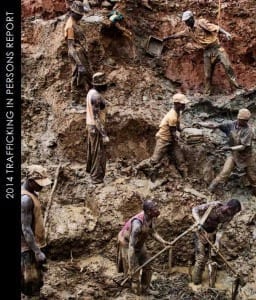Jul 11, 2014

HRW’s Sarah Leah Whitson, Solidarity Center Executive Director Shawna Bader-Blau, James Suzano of ADHRB and James Lynch at Amnesty International spoke at a Capitol Hill Briefing on migrant workers. Credit: Kate Conradt/Solidarity Center
Migrant workers to the Arabian Gulf states are rarely covered by labor law and generally denied the ability to exercise fundamental human rights, including freedom of association, which makes them vulnerable to exploitation and abuse, said panelists at a standing-room-only Capitol Hill briefing Tuesday.
Migrant workers to countries such as Bahrain, Kuwait and Qatar endure a “triangle of oppression,” in which they pay steep fees to get a job, generally have their passports taken by employers once they arrive in country and then find they have no legal protection or recourse when they are abused, said Sarah Leah Whitson, executive director for the Middle East and North Africa Division of Human Rights Watch.
Whitson, who described the migrant worker experience as “akin to indentured servitude,” was one of four panelists at a Capitol Hill briefing this week, “Modern Day Slavery: Combating Migrant Labor Abuses and Ending Human Trafficking in the Gulf.”
Sponsored by the Solidarity Center and the Americans for Democracy and Human Rights in Bahrain (ADHRB), the panel was moderated by Solidarity Center Executive Director Shawna Bader-Blau, who noted the importance of shining “a light on migrant exploitation in the Gulf as part of the broader global fight against human trafficking and forced labor.” Other panelists were James Suzano, ADHRB legal officer, and James Lynch, researcher at Amnesty International London.
The panel was the second of two Capitol Hill events on July 8 highlighting the plight of the 90 million migrants who cross borders every year to work. In the Middle East, some 18.6 million migrant workers toil at jobs such as construction and domestic work.
Panelists repeatedly pointed to the brutality of the employer sponsorship system in Gulf countries “which emboldens employers to mistreat workers,” said Suzano. Known as kafala, the system requires foreign workers to have an employer sponsor, prevents workers from changing jobs without employer approval or judicial authorization, and deports workers who seek new employment or flee abusive conditions. Although most Gulf countries recently have enacted laws to address the abuses inherent in kafala, panelists noted that these laws are not enforced.
Further, said Lynch, it is impossible to “understand the vested interests” that perpetuate employer sponsorship programs in Gulf countries and around the world. Employers benefit from a captive workforce who cannot negotiate for better pay and working conditions—or report abuse to authorities. And often, corruption in governments may mean officials are working with labor recruiters.
Middle Eastern governments refuse to grant citizenship to migrants who have made the country their home for many years, denying them fundamental rights such as the freedom to join unions, bargain collectively and strike, several panelists said. In most Gulf countries, migrant workers comprise the vast majority of the working population, toiling particularly in difficult jobs such as construction and domestic service, yet are not even guaranteed a minimum wage.
As elsewhere around the world, migrants in the region are trafficked for what often turns out to be forced labor. “Human trafficking is much more prevalent than sex trafficking and it needs to be more comprehensively addressed,” said Suzano.
“Ultimately, said Bader-Blau, “the problem of human trafficking in the Gulf is a problem of migrant worker exploitation, and that is a problem of global governance of migration and a problem fundamentally of worker rights and human rights.

Jul 10, 2014
Migrant workers’ high vulnerability to human trafficking is one of three main factors involved in labor trafficking in Thailand, Malaysia and Cambodia, said Neha Misra, Solidarity Center senior specialist for Migration and Human Trafficking in testimony on Capitol Hill July 7.
The other two elements involve a lack of investigations, prosecutions and convictions for forced labor (linked to corruption and government complicity) and a lack of economic pressure by governments and businesses to eliminate the scourge.
Misra was one of four experts testifying on human trafficking and forced labor before the Senate Subcommittee on East Asian and Pacific Affairs. State Department Ambassador Scot Marciel, principal deputy assistant secretary for East Asian And Pacific Affairs at the State Department; Luis CdeBaca, Ambassador-at-Large for the Office to Monitor and Combat Trafficking in Persons; and Jesse Eaves, World Vision senior policy advisor for child protection, also spoke at the hearing, “Combating Forced Labor and Modern-Day Slavery in East Asia and the Pacific.”
The Asia-Pacific region has the greatest number of forced laborers in the world, accounting for more than 50 percent of all forced labor victims. Globally, forced labor generates $51 billion per year in illegal profits, according to the International Labor Organization (ILO).Thailand and Malaysia were among countries cited last month by the U.S. State Department as failing to comply with the minimum standards to address human trafficking over the past year. The two countries were downgraded from the department’s “Tier 2 Watch List” to “Tier 3.” Such a downgrade makes the countries liable to sanctions, which could include the withholding or withdrawal of U.S. non-humanitarian and non-trade-related assistance.
“It’s disturbing to see East Asia and the Pacific not make the kind of progress that’s expected in ending human trafficking,” said Sen. Benjamin Cardin (D-Md.), subcommittee chairman. He acknowledged that while sex trafficking is high profile, labor trafficking also is rampant.
According to Misra, unscrupulous labor recruiters charge migrant workers exorbitant fees for job placement, trapping workers in debt bondage, a situation further exacerbated when employers take workers’ visas and passports, leaving them with no means of escape.
“Labor recruitment fees lead to forced labor and should be eliminated,” Misra said.
Misra also said that multinational corporations have not done enough to prove to consumers that their supply chains are not tainted with forced labor. Multinational corporations need to exert their significant power as buyers to hold suppliers accountable to supply chains free of forced labor. Companies argue that it is too difficult or expensive to completely map their supply chains. If nongovernmental organizations (NGOs) and the media can do it, however, companies can too.“Two of the export sectors with the highest numbers of forced laborers in the region are the seafood and ready-made garment industries, she added.
Read Misra’s full testimony.
Jul 7, 2014
The Solidarity Center’s Bangladesh Worker Rights Defense Fund has received $11,537 in contributions as of June 30 and donations already have assisted with medical bills for union organizers beaten while talking with garment workers and provided a one-month salary for union leaders assaulted and fired by management.
In February, four union organizers, Hashi, Selim, Ali Hossain and Rita, were badly injured when about two dozen people beat, kicked and threw them to the ground as they were speaking to workers in the dormitory where they live. One of the organizers was taken from the scene, beaten severely and dumped, unconscious, nearby. According to several witnesses, the attack was carried out by Chunjee Garments Ltd. factory managers and other men and women.
Your contributions helped pay medical costs for the organizers, two of whom were hospitalized. Donations also replaced the organizers’ mobile phones, which were taken during the attack.
Defense Fund donations have paid for one month’s salary for several union leaders fired in April, including Nazrul Islam, general secretary of Raaj RMG Washing Plant, who was physically assaulted and terminated by the management. Also, five committee members of the Taratex (BD) Ltd., Workers Union each received a one-month salary after factory management fired them. Without your support, they would have been unable to pay their rent.
These examples are just a few ways the Defense Fund has so far provided crucial support to union organizers, enabling them to continue their efforts to help garment workers gain a voice on the job.
The Solidarity Center launched the Bangladesh Worker Rights Defense Fund in April after an increase in violence against union organizers in seeking to improve the safety in some of Bangladesh’s 5,000 garment factories. Following the Rana Plaza collapse in April 2013, and other high-profile catastrophes, the government showed signs of recognizing worker rights and its own labor laws, allowing workers to form their own unions. As a result, garment workers have registered more than 130 factory-level unions in the past year.
But violence and retaliation in recent months against workers seeking to exercise freedom of association has gone unpunished.
It’s not too late to contribute to the Bangladesh Worker Rights Defense Fund and help the brave women and men who often risk their personal safety to improve the safety of garment workers.
Please donate now.

Jul 5, 2014
In Nigeria’s oil-rich Niger Delta, where the nation’s vast oil revenue has not benefited working people, who typically are paid less than $2 per day, women and children are especially vulnerable.
Yet in the face of corruption, environmental degradation, gender discrimination and human rights abuses, a unique, women-led grassroots coalition is training and mobilizing women in urban and rural communities, empowering them to hold local lawmakers accountable and achieve concrete goals in their communities.
Women Initiative for Transparency and Social Justice (WITSOJ), a coalition of union and community groups, formed in 2007, inspired by a Solidarity Center workshop on women’s empowerment and civil-society participation in Warri, a major oil city in Delta State. Since then, WITSOJ has trained more than 5,000 women and young people in hands-on workshops.
“Because of the way the government has been running its affairs (local residents) think they should beg for health care services, schools, roads,” said Sarah Emmanuel-Apia, a lawyer and WITSOJ leader. “We show them the (Nigerian) constitution and the budget and (show them that) these things should come to them even without asking—and if they don’t get it they should come together to make their demands.”
Following one such WITSOJ training in 2011, hundreds of women from several communities marched to the local council building in Oyigbo, a town northeast of Port Harcourt, to demand a health care clinic. Local officials had ignored their requests for years, but empowered by WITSOJ, the women refused to be turned away. Ultimately, the government renovated the area’s dilapidated health clinic and also built a well-equipped health center at nearby Obuakpu.
“Maternal mortality is very high here,” said Emmanuel-Apia. “It’s normal here for women to die giving birth. If bringing the health center will help them live longer, we will support it.”
Emmanuel-Apia and others in WITSOJ are featured in a new Solidarity Center report, “Nigeria: Empowering Women, Transforming Society,” available in English and Spanish.
As a coalition of more than 20 local organizations, WITSOJ regularly taps into the expertise of its members, such as Women in PENGASSAN, the Petroleum and Natural Gas Senior Staff Association of Nigeria.
Ijeoma Dom-Nwachukwu, national chairwoman of Women in PENGASSAN, says the union partners with WITSOJ to fight for “the women who are marginalized in rural areas.
WITSOJ coordinator Dr. Jennifer Spiff says the union’s deep roots in local communities adds credibility to WITSOJ. “The partnership with the union “gives WITSOJ the leverage to be trusted as an organization owned by the masses,” she said.
“Working people see trade unions as representing the people, and believe that WITSOJ cannot be hijacked by politicians, since it has a union collaboration.” The coalition also includes the Nigeria Labor Congress (NLC) and the Trade Union Congress of Nigeria (TUC).
Through its outreach, “WITSOJ has made women realize the need for gender equality, and that most times, women can become as good ambassadors in leadership as their male counterparts,” said journalist Gold Minimah, an active WITSOJ member.
Victory Goodluck, a WITSOJ member and farmer from the Ihuike community in Ahoada East Local Government, points out that the organization’s strategy to focus on women works “because women are instruments of change.”
The report is part of Catalysts for Change, a Solidarity Center series highlighting the working people, their unions and activists who are advancing worker rights and greater equity in their societies.
Jul 2, 2014
 The U.S. State Department’s decision to downgrade Thailand, Malaysia and Venezuela in its 2014 Trafficking in Persons report “should compel (those governments) and other countries with serious human trafficking problems to step up their efforts to fight this horrific human rights crime,” says Melysa Sperber, director of the Alliance to End Slavery and Trafficking (ATEST). The Solidarity Center is one of 11 ATEST member organizations.
The U.S. State Department’s decision to downgrade Thailand, Malaysia and Venezuela in its 2014 Trafficking in Persons report “should compel (those governments) and other countries with serious human trafficking problems to step up their efforts to fight this horrific human rights crime,” says Melysa Sperber, director of the Alliance to End Slavery and Trafficking (ATEST). The Solidarity Center is one of 11 ATEST member organizations.
The three countries were among seven on the department’s “Tier 2 Watch List,” a designation that indicates governments do not fully comply with the U.S. Trafficking Victims Protection Act’s minimum standards, but are making significant efforts to bring themselves into compliance with those standards. The other four countries—Afghanistan, Barbados, Chad and Maldives—were upgraded to “Tier 2.” The Solidarity Center works with partners in Thailand and Malaysia to address forced labor and human trafficking.
By law, countries on the “Tier 2 Watch List” must be moved to another tier after two years. Human rights organizations and worker advocates had also called for Afghanistan, Barbados, Chad and Maldives to be downgraded to “Tier 3,” a designation that makes the countries liable to sanctions, which could include the withholding or withdrawal of U.S. non-humanitarian and non-trade-related assistance.
More than 20 million people are victims of human trafficking, which includes labor and sex trafficking, according to the Trafficking in Persons report. Forty-four countries are on the “Tier 2 Watch List,” including Bahrain, Cambodia, Haiti, Morocco, Qatar, Sri Lanka, Tunisia and Ukraine. Among the 23 countries on Tier 3, the lowest ranking, are Algeria, North Korea, Libya, Russia and Uzbekistan.
A coalition of anti-trafficking groups, including the Solidarity Center, applauded the State Department’s decision to maintain Uzbekistan on Tier 3. According to the report, Uzbekistan’s “government-compelled forced labor of men, women, and children remains endemic during the annual cotton harvest….There were reports that some children aged 15 to 17 faced expulsion from school for refusing to pick cotton.”
Illegal profits from forced labor account for $51 billion per year, according to the International Labor Organization (ILO). The Trafficking in Persons report highlights the high incidence of forced labor in the fishing and mining industries.
Fifty-one narratives in the report identify abuses in the fishing industry, including “men that are enslaved out on the boats out at sea” and in seafood packing, said Luis CdeBaca, Ambassador-at-Large, Office to Monitor and Combat Trafficking in Persons.
“We’ve also seen forced labor in mining noted in the narratives of 46 countries and zero prosecutions or convictions around the world, including diamond mining in North Africa and gold mining in Peru, CdeBaca said at a briefing on the report’s release Friday.
The Trafficking in Persons report, which has been issued annually for 14 years, covers 188 countries and “is a critical tool in the global fight against modern slavery and puts necessary pressure on governments to take a hard look at their efforts to stop human trafficking,” said Polaris Project CEO Bradley Myles.




